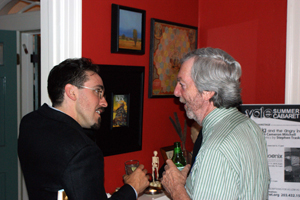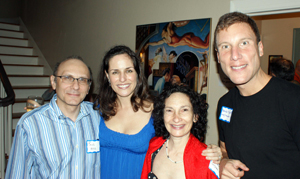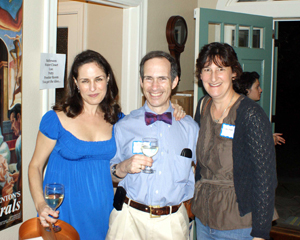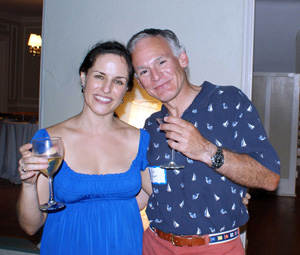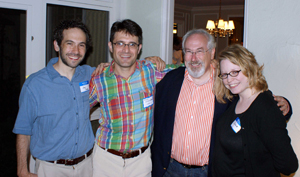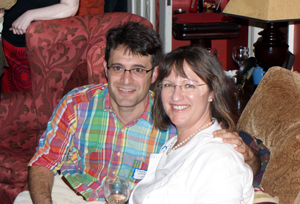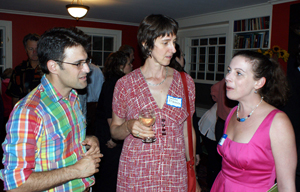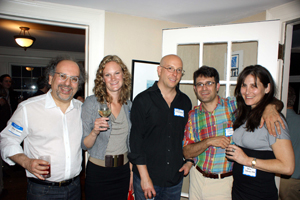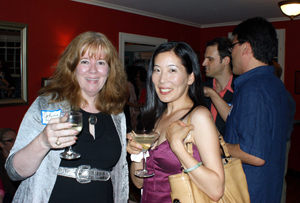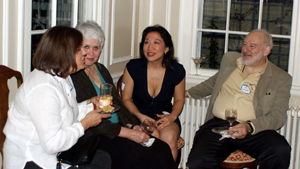When it debuted in Yale Cabaret's 2009/10 Season, Janyia Antrum's campy sci-fi musical Strange Love in Outer Space was the success story of The Dwight/Edgewood Project (see my review here). Now its success continues with the play's debut in New York in the eclectic and exciting New York Fringe Festival, Aug. 14, 17, 19, 21, and 23, including a mention in the New York Times. The Dwight/Edgewood Project is held every July under the auspices of Yale School of Drama/Yale Repertory Theater. It's a four week program that introduces New Haven area kids to the elements of theater, from playwrighting and design to acting and directing, with classes staffed by Yale School of Drama students. For the last two years, August Lewis Troup Middle School and Wexler-Grant Community School have been partners in the project.
Janyia wrote the first part of Strange Love in summer 2009, at the age of twelve. When she got home after the project ended, she felt the urge to continue the story and wrote a second part. The Yale Cabaret commissioned a third act and then produced the play. Jorge Rodriguez, who has worked with Janyia as a producer from the beginning, comments: Janyia "wrote a play that was incredibly well structured, with outstanding character development and incredibly funny." The play impressed her fellow students at D/EP and the staff "was stunned by her sense of comedic timing. The zany, campy humor that distinguishes this play were of her own creation and a result, as she often joked about, of years of watching TV sitcoms like The Nanny."
Christopher Mirto, who directed the D/EP production and the Yale Cab production, is at the helm again for the Fringe production. He also plays the memorable role of Mr. Grumis, a fish-like alien who courts the statuesque Splontusia. For Mirto, the play works for a lot of reasons:
"Janyia's story is actually really moving and has a strong leading female character. It's campy fun but very serious and imaginative and comes from such a genuine place. It's surprisingly smart, has great comic timing, [and] the songs move the plot forward; the characters are crazy, but have very clear desires. The Fringe is a good fit because it's an unusual show in style, form, characters, design. It doesn't have a big or complicated design, so it's easy to transfer. Kind of like Pixar films, it appeals to adults and children."
The Fringe version features some of the same cast as the Cabaret version -- Mirto, and his longtime associate Brian Valencia, who also mentored Janyia in D/EP, as the dastardly Dr. Tuscanunin -- but also presents some changes, with Caitlin Clouthier, from NYU's Tisch School of the Arts, in the central role of multi-eyed Splontusia, and recent YSD graduate Aja Naomi King as B'Quisha Star Jones, the dog/pirate queen. The new production also boasts a new song.
The Fringe is a huge, sprawling drama festival that Mirto calls "a total crapshoot." The sublime and the ridiculous rub shoulders and you go in not quite knowing what you're going to get. Strange Love has already proven itself capable of mixing it up with the challenging and off-the-wall offerings of the Cab, and now it will run side-by-side with the off-off-Broadway shows of the West Village.
Mirto's excited by the challenge and comments, "There is this really nice non-jaded aspect of Janyia that is refreshing for me: she reminds me that it should be fun, it should entertain, and it should be simple; and that imagination goes a long way!"
It's an imagination that has created a play that's out of this world, a play that has already gone a long way from an afterschool project to a New York city debut.
Strange Love in Outer Space, A Musical Traumedy
Book and Lyrics by Janyia Antrum; Music by Nick Morgan; Directed by Christopher Mirto
The Cherry Pit (venue #14), 155 Bank Street, New York, NY (West & Washington Street)
Sat. Aug. 14, 2:15 p.m.; Tues. Aug. 17, 10:30 p.m.; Thurs. Aug. 19, 8 p.m.; Sat. Aug. 21, 5:30 p.m.; Mon. Aug. 23, 4 p.m; Tickets $15-$18; for tickets: www.FringeNYC.org
Presented by The New York International Fringe Festival; A Production of The Present Company
 Director Devin Brain and the cast of the current Yale Summer Cabaret show, The Phoenix, have given themselves quite a task: to render a situation that could be either fantasy or reality, when either is potentially alienating. Based on a haunting story by best-selling Australian author Isobelle Carmody, the play has been derived by the cast via an improvisational process of discovery, which means that the presentation is not scripted so much as agreed upon through trial and error during a long period of gestation.
Director Devin Brain and the cast of the current Yale Summer Cabaret show, The Phoenix, have given themselves quite a task: to render a situation that could be either fantasy or reality, when either is potentially alienating. Based on a haunting story by best-selling Australian author Isobelle Carmody, the play has been derived by the cast via an improvisational process of discovery, which means that the presentation is not scripted so much as agreed upon through trial and error during a long period of gestation.